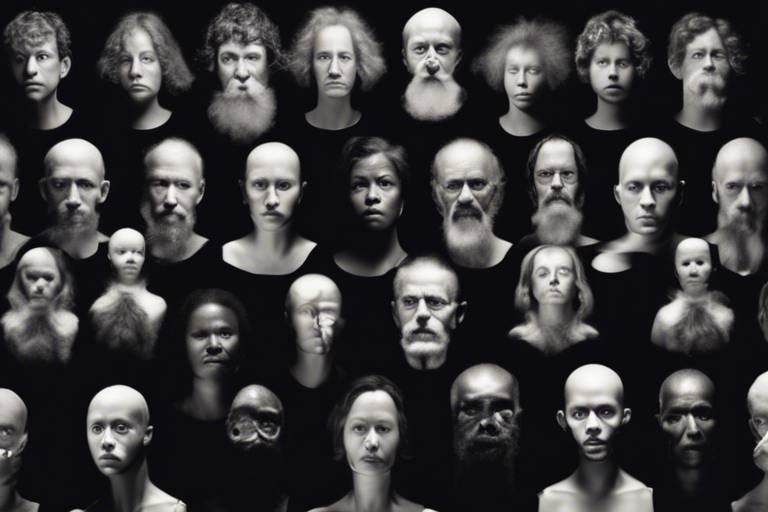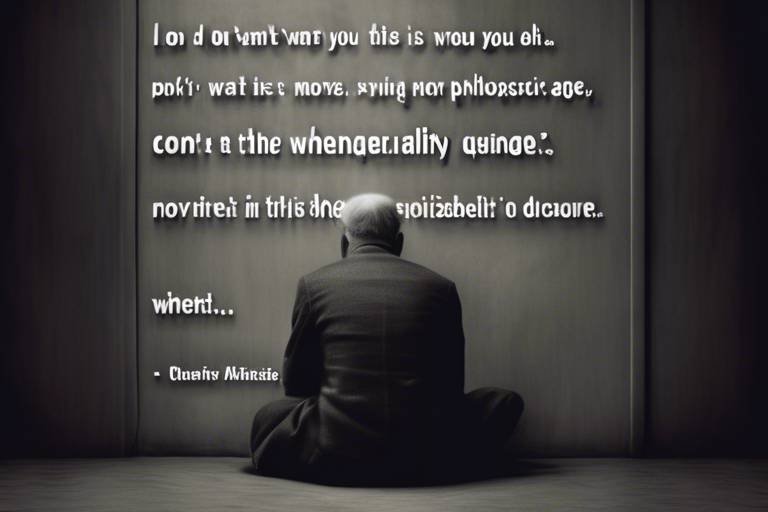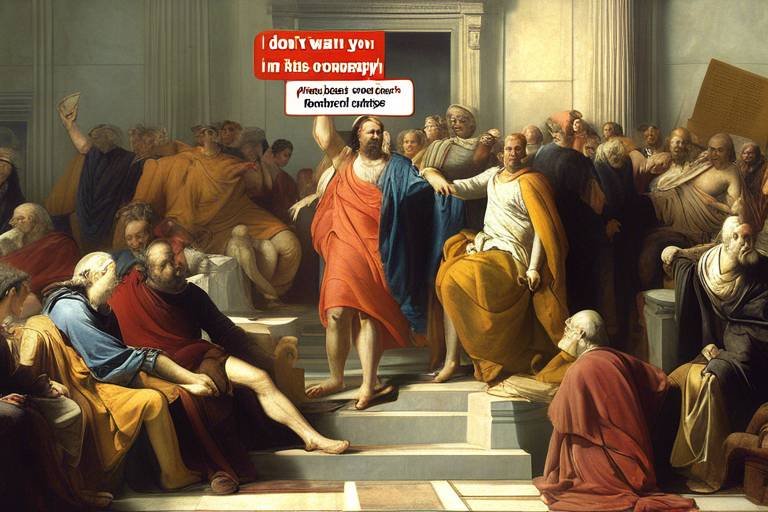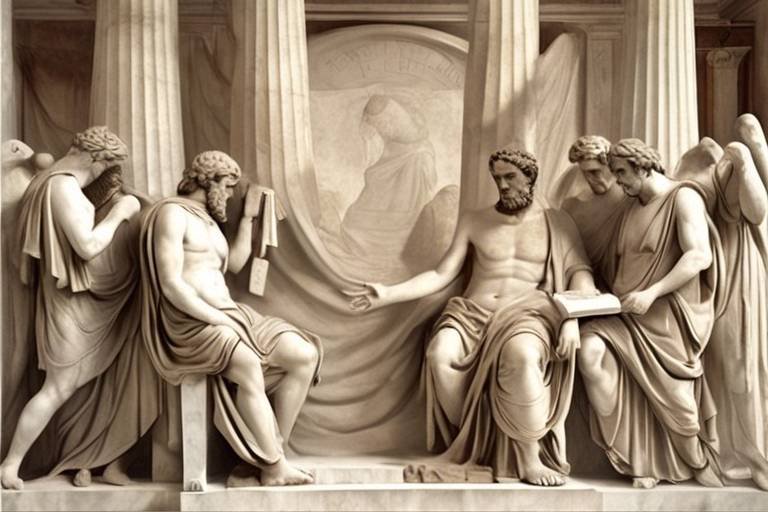Traces of Socratic Philosophy in Modern Thought
When we think about the roots of modern thought, it's impossible to overlook the profound influence of Socratic philosophy. This ancient wisdom, which dates back to the great philosopher Socrates, has shaped the way we engage with ideas, ethics, and education today. Socrates believed in the power of questioning, and his method of inquiry has transcended time, leaving indelible marks on contemporary thinkers and movements. But what exactly are these traces, and how do they manifest in our current understanding of the world?
To grasp the essence of Socratic philosophy, we must first appreciate the Socratic Method, a foundational technique that emphasizes dialogue and critical questioning. This approach is not merely about finding answers; it's about fostering a deeper understanding through active engagement. Imagine sitting in a classroom where the teacher encourages you to question everything, to dig deeper into your beliefs and assumptions. This method cultivates a culture of critical thinking and self-reflection, which are essential skills in our fast-paced, information-saturated society. In fact, many educators today are adopting this method to enhance student engagement and learning outcomes.
Moreover, Socratic philosophy profoundly influences our discussions on ethics and morality. In a world where moral dilemmas are increasingly complex, Socrates challenges us to examine our beliefs rigorously. He prompts us to ask ourselves: "What is the right thing to do?" This reflective approach encourages individuals to navigate moral challenges thoughtfully, promoting a more reasoned understanding of ethics in contemporary society. The Socratic inquiry leads us to question not just the what of our beliefs, but the why behind them, fostering a culture of introspection and moral reasoning.
At the heart of Socratic thought is the idea that virtue is knowledge. This concept suggests that if we truly understand what is good, we will naturally strive to do good. In modern times, this belief continues to resonate, influencing various ethical theories that prioritize the pursuit of wisdom as a pathway to moral behavior. Think of it as a compass guiding us towards virtuous living; the more knowledge we acquire, the clearer our moral path becomes. However, while this perspective is compelling, it also invites critique. Some argue that equating virtue with knowledge oversimplifies the complexities of human behavior and ethics.
As we explore the practical applications of Socratic principles in today's world, we see their integration into various ethical frameworks. Many contemporary ethical discussions emphasize informed decision-making, underscoring the role of knowledge in achieving virtuous outcomes. For instance, in fields like business ethics and public policy, the Socratic emphasis on questioning and dialogue fosters a more transparent and accountable decision-making process. Yet, it's crucial to acknowledge the critiques surrounding virtue ethics. Detractors argue that a simplistic view of ethics can overlook the nuances of human experience, highlighting the need for a more comprehensive understanding of morality in our complex world.
In the realm of education, Socratic principles are not just relevant; they are transformative. The modern educational landscape increasingly values critical thinking and dialogue, moving away from rote memorization towards a model that encourages students to engage actively with content. This shift mirrors Socratic teachings, where the goal is not merely to impart knowledge but to inspire a lifelong love of learning. Imagine classrooms buzzing with discussion, where students feel empowered to challenge ideas and explore new perspectives. This dynamic learning environment is a testament to the enduring impact of Socratic philosophy.
Finally, the influence of Socratic thought extends beyond education and ethics into the realm of political philosophy. Many contemporary philosophers draw inspiration from Socratic themes, emphasizing the importance of civic engagement and critical discourse. Socratic ideas encourage citizens to question the status quo, to engage in meaningful discussions about governance, justice, and their roles within society. This engagement is vital for the health of democracies today, reminding us that active participation is essential for progress.
- What is the Socratic Method? The Socratic Method is a form of cooperative argumentative dialogue that stimulates critical thinking, typically through asking and answering questions to stimulate deeper understanding.
- How does Socratic philosophy influence modern ethics? Socratic philosophy encourages individuals to reflect on their beliefs and moral dilemmas, fostering a more reasoned and thoughtful approach to ethics.
- What role does Socratic thought play in education? Socratic principles promote critical thinking and dialogue in educational settings, encouraging students to engage actively with content and develop a deeper understanding of the material.
- How is Socratic philosophy relevant to political discourse today? Socratic ideas encourage citizens to engage in critical discussions about governance and justice, which are essential for a healthy democratic society.

The Socratic Method
The Socratic Method is more than just a teaching technique; it's a dynamic and engaging way of exploring ideas through dialogue and questioning. Imagine sitting in a circle with your peers, each person contributing their thoughts while a facilitator gently nudges you to think deeper. This method, pioneered by the ancient Greek philosopher Socrates, encourages participants to challenge assumptions and engage in critical thinking. It's a bit like peeling an onion—every question you ask removes a layer, revealing a more profound understanding of the topic at hand.
At its core, the Socratic Method revolves around the principle that asking the right questions can lead to greater insights. Instead of simply providing answers, educators using this approach guide students to discover knowledge for themselves. This not only fosters a more active learning environment but also cultivates essential skills such as critical thinking, self-reflection, and the ability to articulate one's thoughts clearly.
The effectiveness of the Socratic Method can be seen in various educational settings, from high school classrooms to university seminars. In these environments, students are encouraged to engage in discussions that often resemble debates. For instance, a teacher might pose a provocative question like, “What is justice?” and then facilitate a discussion where students share their perspectives. This process not only helps students articulate their beliefs but also exposes them to diverse viewpoints, enhancing their understanding.
However, it's essential to recognize that the Socratic Method is not just about asking questions for the sake of it. The goal is to foster a deeper understanding of complex issues. This method can be particularly powerful when addressing challenging subjects such as ethics, politics, or philosophy. Consider a scenario where students are discussing the implications of free speech. Through guided questioning, they can explore various angles, such as:
- What are the limits of free speech?
- How does free speech relate to societal values?
- Can free speech ever be harmful?
By engaging in this type of inquiry, students not only learn to think critically but also develop a sense of intellectual humility. They begin to understand that their beliefs might not be absolute and that there’s always more to learn. This realization is invaluable in today’s world, where information is abundant, but understanding is often superficial.
Moreover, the Socratic Method has found its way into various professional fields, including law, medicine, and business. For instance, in law schools, students often engage in Socratic questioning to analyze cases and develop their legal reasoning. This practice prepares them for real-world scenarios where critical thinking and the ability to argue effectively are paramount.
In summary, the Socratic Method serves as a powerful tool in modern education and beyond. By prioritizing dialogue and inquiry over rote memorization, it encourages individuals to think critically, engage deeply, and embrace the complexity of ideas. As we continue to navigate an increasingly complex world, the relevance of Socratic questioning remains as vital as ever. It not only shapes better thinkers but also fosters a culture of curiosity and open-mindedness.

Ethics and Morality
Socratic philosophy has had a profound impact on how we approach ethics and morality in the modern world. At its core, the Socratic method encourages individuals to question their own beliefs and the ethical frameworks they operate within. This relentless pursuit of understanding is not just a philosophical exercise; it’s a way to foster a more reflective and reasoned approach to the moral dilemmas we face in contemporary society. Imagine walking through a dense forest of moral ambiguity, where every tree represents a different belief or ethical stance. The Socratic method acts like a guiding light, illuminating the path toward deeper understanding and clarity.
One of the most significant contributions of Socratic thought to modern ethics is the idea that moral knowledge is essential for virtuous living. The Socratic belief that virtue is knowledge suggests that a person cannot truly act ethically without understanding what is right and wrong. This perspective has led to numerous discussions in ethical theory, emphasizing the importance of informed decision-making. For instance, consider how professionals in fields like medicine or law must navigate complex ethical landscapes. Their ability to make sound decisions often hinges on their understanding of ethical principles, which can be traced back to Socratic questioning.
Furthermore, the Socratic method promotes a culture of dialogue. In today's world, where social media often amplifies polarizing views, fostering open discussions about ethics can lead to greater understanding and empathy among individuals. By encouraging people to articulate their beliefs and challenge them through dialogue, we create an environment where moral reasoning flourishes. This is particularly relevant in contemporary issues such as climate change and social justice, where diverse perspectives must be considered to arrive at a collective ethical stance.
However, while Socratic philosophy provides a strong foundation for ethical discussions, it is not without its critiques. Some argue that the emphasis on knowledge as the basis of virtue oversimplifies the complexities of moral issues. For instance, emotions, cultural contexts, and personal experiences also play crucial roles in shaping our ethical beliefs. Therefore, while the Socratic method encourages critical thinking, it must be complemented by a broader understanding of human experience to address the multifaceted nature of morality.
In conclusion, the influence of Socratic philosophy on modern discussions of ethics and morality is both profound and enduring. By promoting critical inquiry and reflection, it challenges us to examine our beliefs and strive for a deeper understanding of what it means to live a virtuous life. As we continue to navigate the complexities of ethical dilemmas in our society, the principles of Socratic thought will undoubtedly remain a vital part of the conversation.
- What is the Socratic method? The Socratic method is a form of cooperative argumentative dialogue that stimulates critical thinking and illuminates ideas through questioning.
- How does Socratic philosophy influence modern ethics? It encourages individuals to question their beliefs and emphasizes the importance of knowledge in ethical decision-making.
- What are some critiques of Socratic ethics? Critics argue that it oversimplifies moral issues by focusing primarily on knowledge, neglecting the emotional and cultural contexts that influence ethics.

Virtue as Knowledge
When we dive into the depths of Socratic philosophy, one of the most captivating ideas that emerges is the notion that virtue is knowledge. This idea is not merely an abstract concept; it serves as a guiding principle that influences how we perceive morality and ethical behavior. Socrates believed that if a person truly understands what is good, they will inherently act in accordance with that understanding. It’s almost like saying, if you know how to bake a cake, you’re bound to whip up something delicious, right? However, the reality is often more complex than that.
In contemporary discussions, this principle challenges us to reflect on our own moral compasses. How often do we find ourselves in situations where we know the right thing to do, yet we hesitate or choose otherwise? This discrepancy between knowledge and action highlights a critical aspect of human behavior. Socratic philosophy urges us to examine this gap, prompting questions like: Is ignorance truly the root of all evil? Or, more provocatively, Can we ever claim to be virtuous if we lack the knowledge to act rightly?
Moreover, the idea of virtue as knowledge extends beyond individual morality into the fabric of society itself. When we consider ethical frameworks today, many incorporate this Socratic principle by emphasizing the importance of informed decision-making. For instance, think about how we approach issues like climate change or social justice. These discussions often center around knowledge-based solutions rather than mere opinions. When we equip ourselves with the right information, we are better positioned to make choices that reflect our values and contribute positively to society.
However, it’s essential to recognize that the relationship between virtue and knowledge is not without its critiques. Some argue that equating virtue with knowledge oversimplifies the complexities of moral dilemmas. In many instances, individuals may possess the knowledge of what is right, yet they still struggle to act accordingly due to emotional, social, or situational pressures. This brings us to the heart of the debate: Is knowledge alone sufficient for virtuous action? The answer remains nuanced, as it intertwines with factors such as personal circumstances, societal influences, and emotional intelligence.
To illustrate this complexity, consider the following table that outlines the interplay between virtue, knowledge, and action:
| Aspect | Virtue | Knowledge | Action |
|---|---|---|---|
| Definition | Adherence to moral principles | Understanding of facts and concepts | Behavioral manifestation of virtue |
| Interdependence | Requires knowledge to guide behavior | Informs ethical decisions | Can be influenced by emotions and context |
| Challenges | May conflict with personal desires | Can be misunderstood or misapplied | Often swayed by external factors |
In summary, the Socratic belief that virtue is synonymous with knowledge continues to resonate in modern ethical discussions. It challenges us to pursue wisdom not just for the sake of knowledge itself but as a pathway to moral behavior and character development. As we navigate the complexities of our contemporary world, this principle serves as a reminder that the quest for knowledge is not merely an academic exercise; it is a crucial component in our journey toward becoming better individuals and, ultimately, a better society.
- What does "virtue is knowledge" mean? It means that true understanding of what is good leads to virtuous actions.
- How can we apply this idea in our daily lives? By striving to gain knowledge about ethical issues and applying that understanding to our choices.
- Are there limitations to this principle? Yes, while knowledge is vital, emotional and situational factors can influence our actions.

Practical Applications
The principles of Socratic philosophy are not just relics of ancient thought; they find practical applications in various aspects of modern life, particularly in ethics, education, and decision-making. One of the most significant ways these principles manifest is through the encouragement of critical thinking. In today's fast-paced world, where information is abundant and often overwhelming, the ability to think critically is more crucial than ever. Socratic questioning, which involves probing deeper into the reasoning behind beliefs and actions, serves as a valuable tool in both personal and professional contexts.
For instance, in the workplace, leaders who embrace the Socratic method can foster a culture of open dialogue and inquiry. Instead of merely dictating tasks or solutions, they can encourage team members to ask questions and explore alternative viewpoints. This approach not only leads to better decision-making but also enhances team cohesion and innovation. Consider the following practical applications of Socratic principles in various fields:
| Field | Application | Example |
|---|---|---|
| Education | Encouraging student-led discussions | Using open-ended questions to stimulate debate in the classroom |
| Business | Facilitating constructive feedback | Implementing regular brainstorming sessions where all ideas are explored |
| Healthcare | Patient-centered care | Encouraging patients to ask questions about their treatment options |
Moreover, the Socratic approach emphasizes the importance of informed decision-making. In our daily lives, we often face moral dilemmas that require us to weigh our options carefully. By applying Socratic questioning, we can clarify our values and beliefs, ultimately leading to more ethical choices. For example, when considering a career move, one might ask:
- What are my core values?
- How does this opportunity align with my long-term goals?
- What impact will my decision have on others?
These questions not only guide us toward making choices that reflect our true selves but also encourage a deeper understanding of our responsibilities to others. In essence, the Socratic method cultivates a mindset that prioritizes self-awareness and responsibility, which are essential in navigating the complexities of modern life.
In summary, the practical applications of Socratic philosophy extend far beyond the classroom. Whether in the workplace, healthcare, or personal decision-making, the emphasis on questioning, dialogue, and ethical reasoning provides a framework for making thoughtful choices. By integrating these principles into our daily lives, we not only honor the legacy of Socratic thought but also enhance our capacity for meaningful engagement with the world around us.
- What is the Socratic Method?
The Socratic Method is a form of cooperative argumentative dialogue that stimulates critical thinking through asking and answering questions. - How can I apply Socratic principles in my life?
You can apply these principles by engaging in self-reflective questioning and encouraging open discussions in your personal and professional interactions. - What are the benefits of using Socratic questioning?
Socratic questioning promotes deeper understanding, enhances critical thinking skills, and fosters ethical decision-making.

Critiques of Virtue Ethics
While the idea that virtue is knowledge has undeniably influenced ethical discussions, it is not without its critics. Many argue that this perspective oversimplifies the complexities of moral dilemmas we face in our daily lives. For instance, consider a situation where a person must choose between telling the truth and protecting someone's feelings. Here, the straightforward notion that knowledge equates to virtue becomes murky, as different values clash and complicate the decision-making process.
Critics often point out that virtue ethics, particularly the Socratic version, may lead to a form of elitism. The assumption that knowledge can guide moral behavior suggests that those who are less informed or educated are inherently less virtuous. This notion raises questions about social justice and equality. How can we ensure that moral standards are accessible to everyone, regardless of their educational background? In a world where information is power, this critique highlights a significant flaw in the virtue ethics framework.
Moreover, the reliance on knowledge as the sole determinant of virtue may neglect the emotional and situational aspects of ethical decision-making. Emotions play a crucial role in how we navigate moral landscapes. For example, a person with extensive knowledge might still struggle to act virtuously if they are overwhelmed by fear, anger, or love. Thus, some argue that a more nuanced understanding of ethics should incorporate emotional intelligence alongside intellectual knowledge.
To further illustrate these critiques, let's consider a table that outlines the strengths and weaknesses of the virtue ethics approach:
| Strengths | Weaknesses |
|---|---|
| Promotes personal growth and character development | Oversimplifies complex moral issues |
| Encourages informed decision-making | May lead to elitism in moral standards |
| Fosters a deeper understanding of ethics | Neglects the role of emotions in moral decisions |
In conclusion, while Socratic virtue ethics offers valuable insights into moral philosophy, it is essential to recognize its limitations. Engaging with these critiques allows for a richer and more comprehensive understanding of ethics, paving the way for frameworks that consider the interplay between knowledge, emotion, and social context.
- What is virtue ethics? Virtue ethics is a branch of moral philosophy that emphasizes the role of character and virtue in moral philosophy rather than the rules or consequences of actions.
- How does Socratic philosophy influence modern ethics? Socratic philosophy encourages individuals to engage in critical self-reflection and dialogue, shaping contemporary discussions on morality and ethics.
- What are the main critiques of virtue ethics? Critics argue that virtue ethics oversimplifies complex moral issues, may lead to elitism, and neglects the emotional aspects of decision-making.

Critical Thinking in Education
The importance of critical thinking in education cannot be overstated. It serves as the bedrock of effective learning, allowing students to not only absorb information but also to question and analyze it. The Socratic Method, with its emphasis on dialogue and inquiry, plays a pivotal role in fostering this critical mindset. Imagine a classroom where students are not just passive recipients of knowledge, but active participants in their learning journey. This dynamic approach transforms education from a mere transfer of facts into a vibrant exchange of ideas.
At its core, critical thinking encourages students to engage with content on a deeper level. Rather than simply memorizing dates or formulas, learners are prompted to ask questions like, “Why is this important?” or “How does this connect to what I already know?” This not only enhances their understanding but also cultivates a sense of curiosity and a love for learning. The Socratic Method, which involves posing open-ended questions, invites students to explore various perspectives and develop their reasoning skills.
Incorporating Socratic principles into educational practices can take various forms. For instance, educators might use techniques such as:
- Encouraging group discussions that challenge assumptions.
- Facilitating debates on controversial topics to promote diverse viewpoints.
- Implementing reflective exercises that require students to consider their thought processes.
These strategies not only enhance critical thinking but also prepare students for real-world challenges. In an age where information is abundant and often misleading, the ability to critically assess sources and arguments is invaluable. Students equipped with strong critical thinking skills are more likely to become informed citizens who can navigate complex societal issues.
Moreover, the benefits of critical thinking extend beyond academic achievement. It fosters essential life skills such as problem-solving, decision-making, and effective communication. When students learn to think critically, they become adept at evaluating situations and making informed choices, both in their personal and professional lives. This holistic approach to education aligns perfectly with the Socratic idea that learning is a lifelong journey.
To further illustrate the impact of critical thinking in education, consider the following table that outlines the differences between traditional and Socratic teaching methods:
| Aspect | Traditional Teaching | Socratic Teaching |
|---|---|---|
| Role of Teacher | Authority figure who delivers information | Facilitator who guides inquiry |
| Student Engagement | Passive listening | Active participation and dialogue |
| Learning Outcome | Memorization of facts | Deep understanding and critical analysis |
In conclusion, critical thinking is not just a skill; it is a transformative approach to education that empowers students to become thoughtful, engaged learners. By embracing the Socratic Method, educators can cultivate a classroom environment that values inquiry and reflection, ultimately preparing students for the complexities of modern life. The legacy of Socratic philosophy continues to shape educational practices, ensuring that the quest for knowledge remains a vibrant and dynamic process.
- What is the Socratic Method? The Socratic Method is a form of cooperative argumentative dialogue that stimulates critical thinking through asking and answering questions.
- How does critical thinking benefit students? Critical thinking enhances students' ability to analyze information, make informed decisions, and solve complex problems.
- Can critical thinking be taught? Yes, critical thinking can be cultivated through specific teaching methods, such as the Socratic Method, which encourages inquiry and dialogue.

Influence on Modern Philosophers
The influence of Socratic philosophy on modern thinkers is nothing short of profound. From the way we approach questions of existence to how we frame our ethical dilemmas, the echoes of Socratic inquiry resonate through contemporary philosophical discourse. Many modern philosophers have not only embraced the Socratic Method but have also built upon its foundational principles to explore new dimensions of thought. For instance, philosophers like Alasdair MacIntyre and Martha Nussbaum have drawn from Socratic dialogues to articulate their views on virtue ethics and moral philosophy, emphasizing the importance of community and shared values in ethical reasoning.
One of the most compelling aspects of Socratic philosophy is its insistence on the importance of questioning. The Socratic Method, characterized by a dialogical approach, encourages individuals to engage deeply with their beliefs. This has led to a resurgence in interest in the role of dialogue in philosophical inquiry. Thinkers today often reflect on the Socratic ideal of examining one’s life, suggesting that self-reflection is vital for personal and intellectual growth. This is especially evident in the works of existentialists who emphasize the search for authenticity and meaning, paralleling Socratic themes of personal inquiry.
Moreover, the impact of Socratic thought extends into the realm of political philosophy. Modern philosophers are increasingly recognizing the significance of engaging citizens in critical discourse about governance and justice. The Socratic emphasis on dialogue and questioning helps to cultivate a more informed and active citizenry, encouraging individuals to challenge the status quo and participate meaningfully in democratic practices. This is particularly relevant in today’s political climate, where the need for thoughtful engagement and critical analysis is more important than ever.
| Philosopher | Key Contribution | Socratic Influence |
|---|---|---|
| Alasdair MacIntyre | Virtue Ethics | Emphasizes community and tradition in moral reasoning. |
| Martha Nussbaum | Capabilities Approach | Focuses on human flourishing and the role of emotions in ethics. |
| Simone de Beauvoir | Existentialism | Explores authenticity and the nature of freedom. |
| John Rawls | Theory of Justice | Advocates for fairness and equality in social contracts. |
In conclusion, the legacy of Socratic philosophy is alive and well in modern thought. Its principles serve as a guiding light for contemporary philosophers who strive to understand the complexities of human existence and morality. As we navigate the challenges of our time, the Socratic call to examine our beliefs and engage in meaningful dialogue remains a crucial element of philosophical inquiry. The relevance of Socratic thought in today’s world is a testament to its enduring power and influence.
- What is the Socratic Method? The Socratic Method is a form of cooperative argumentative dialogue that stimulates critical thinking and illuminates ideas through questioning.
- How does Socratic philosophy influence modern ethics? Socratic philosophy encourages individuals to reflect on their beliefs, leading to a more reasoned approach to moral dilemmas.
- Who are some modern philosophers influenced by Socratic thought? Notable philosophers include Alasdair MacIntyre, Martha Nussbaum, and John Rawls, who incorporate Socratic principles into their work.
- Why is dialogue important in philosophy? Dialogue fosters critical thinking and allows for the exploration of diverse perspectives, which is essential for philosophical inquiry.

Existentialism and Socratic Inquiry
Existentialism, a philosophical movement that emerged in the 20th century, deeply resonates with the principles laid out by Socrates centuries earlier. At its core, existentialism emphasizes the importance of individual experience, personal responsibility, and the quest for meaning in a seemingly indifferent universe. This philosophical approach encourages individuals to confront their own existence and make choices that reflect their authentic selves. In this context, the Socratic inquiry serves as a powerful tool, prompting individuals to engage in profound self-examination and critical questioning.
Just as Socrates famously stated, "The unexamined life is not worth living," existentialists echo this sentiment by arguing that true understanding of one's existence requires an active engagement with personal beliefs and values. The Socratic method, characterized by dialogue and questioning, fosters an environment where individuals are encouraged to explore their thoughts and feelings deeply. This process often leads to the realization that meaning is not handed down from above but is something we must construct for ourselves. By challenging assumptions and probing the depths of our beliefs, we can uncover insights that guide us toward a more authentic life.
Moreover, existentialist thinkers such as Jean-Paul Sartre and Simone de Beauvoir drew heavily on Socratic principles to advocate for freedom and authenticity. They emphasized that while we are thrown into existence without a predetermined purpose, it is our responsibility to create meaning through our choices and actions. This aligns closely with the Socratic belief that knowledge and virtue are intertwined; by understanding ourselves and our motivations, we can lead more virtuous and meaningful lives.
One of the most compelling aspects of the connection between existentialism and Socratic inquiry is the emphasis on dialogue. In both philosophies, the act of questioning is not merely a means to an end but a vital part of the journey toward self-discovery. Engaging in discussions with others allows us to challenge our perspectives and refine our understanding. This is particularly relevant in today's world, where individuals often find themselves grappling with complex moral and existential dilemmas.
To illustrate the influence of Socratic inquiry on existentialist thought, consider the following key themes:
- Personal Responsibility: Existentialism asserts that we are responsible for our choices, mirroring the Socratic emphasis on individual accountability.
- Search for Meaning: Both philosophies encourage a deep exploration of what it means to live a meaningful life.
- Critical Dialogue: Engaging in conversations that challenge our beliefs is essential in both Socratic and existential thought.
In conclusion, the interplay between existentialism and Socratic inquiry highlights the enduring relevance of Socratic philosophy in contemporary discussions about existence, meaning, and personal authenticity. As we navigate the complexities of modern life, embracing the Socratic method can empower us to question our assumptions, explore our values, and ultimately lead lives that are rich with purpose and understanding.
- What is the Socratic Method? The Socratic Method is a form of cooperative argumentative dialogue that stimulates critical thinking and illuminates ideas through questioning.
- How does existentialism relate to Socratic philosophy? Existentialism emphasizes personal responsibility and the search for meaning, which aligns with the Socratic focus on self-examination and critical inquiry.
- Can Socratic questioning improve my decision-making? Yes! Engaging in Socratic questioning can help clarify your beliefs and values, leading to more informed and authentic decisions.

Political Philosophy
When we dive into the realm of , the echoes of Socratic thought are unmistakable. Socrates, through his relentless questioning, laid the groundwork for critical discourse about governance, justice, and the role of the individual in society. His approach encourages us to not only accept the status quo but to actively engage in discussions that shape our community and political landscape. This is particularly relevant today, as we navigate complex issues that require thoughtful consideration and dialogue.
One of the most significant contributions of Socratic philosophy to political thought is the emphasis on the importance of questioning authority. Socrates famously challenged the Athenian leaders of his time, prompting citizens to reflect on their beliefs and the systems that govern them. This tradition continues in modern democratic practices, where questioning and debate are seen as vital components of a healthy political environment. In fact, many democratic societies thrive on the principle that citizens should question their leaders and policies, ensuring accountability and transparency.
Moreover, Socratic principles encourage a deeper understanding of justice. Socrates believed that justice is not merely a set of rules but a pursuit of the common good. This idea resonates in contemporary political discussions, where the focus often shifts from individual gain to collective well-being. The Socratic method, with its emphasis on dialogue, helps illuminate the complexities of justice by encouraging individuals to articulate their views and challenge opposing perspectives. This process fosters a more inclusive dialogue, allowing for a richer understanding of what justice truly means in modern society.
To illustrate the impact of Socratic thought on political philosophy, consider the following table that highlights key themes:
| Socratic Theme | Modern Application |
|---|---|
| Questioning Authority | Encourages civic engagement and accountability in governance. |
| Justice as Common Good | Promotes discussions about social policies and welfare. |
| Dialogue and Discourse | Fosters a culture of debate and critical thinking in political arenas. |
In addition, Socratic inquiry has found its way into the frameworks of contemporary political movements. Activists and thinkers alike utilize Socratic questioning to dissect complex issues such as social justice, human rights, and environmental policy. By applying this method, they encourage others to think critically about their beliefs and the implications of their actions, fostering a more engaged and informed citizenry.
In essence, the influence of Socratic philosophy on political thought is profound and enduring. As we grapple with the challenges of our time, the Socratic method serves as a reminder of the importance of questioning, dialogue, and the pursuit of justice. It inspires us to not only participate in our political systems but to do so with a sense of responsibility and critical awareness. After all, as Socrates himself might suggest, the unexamined life is not worth living, and this applies equally to our political lives.
- What is the Socratic Method?
The Socratic Method is a form of cooperative argumentative dialogue that stimulates critical thinking through asking and answering questions.
- How does Socratic philosophy influence modern ethics?
Socratic philosophy encourages individuals to reflect on their beliefs and decisions, fostering a more thoughtful approach to ethics and morality.
- Why is questioning authority important in politics?
Questioning authority is crucial for accountability and transparency, ensuring that leaders act in the best interest of the public.
Frequently Asked Questions
- What is the Socratic Method?
The Socratic Method is a form of cooperative argumentative dialogue that stimulates critical thinking and illuminates ideas. It involves asking and answering questions to encourage deeper understanding and self-reflection. This method is widely used in educational settings to foster engagement and promote active learning.
- How does Socratic philosophy influence modern ethics?
Socratic philosophy has a profound impact on contemporary discussions about ethics and morality. By challenging individuals to scrutinize their beliefs, it encourages a more reflective approach to moral dilemmas. This scrutiny helps people make informed decisions based on reasoned arguments rather than mere emotions or societal norms.
- What does 'virtue as knowledge' mean?
The idea that 'virtue is knowledge' suggests that true moral behavior stems from understanding and wisdom. Socrates believed that if individuals genuinely know what is right, they will act accordingly. This concept continues to resonate in modern ethical theories, emphasizing the importance of knowledge in achieving a virtuous life.
- Are there critiques of virtue ethics based on Socratic thought?
Yes, while the idea of virtue as knowledge is compelling, critics argue that it oversimplifies complex moral issues. They point out that not all ethical dilemmas can be resolved through knowledge alone, highlighting the need for a more nuanced understanding of morality that considers emotions, relationships, and context.
- How is critical thinking integrated into modern education?
Critical thinking is a cornerstone of modern educational practices, largely influenced by Socratic principles. Educators encourage students to engage actively with content through questioning and dialogue, thus promoting a deeper and more meaningful learning experience. This method helps students develop the skills necessary for independent thought and informed decision-making.
- Which modern philosophers are influenced by Socratic thought?
Many contemporary philosophers draw inspiration from Socratic ideas, integrating them into their theories. This ongoing dialogue reflects the lasting impact of Socratic philosophy on modern philosophical discourse, with thinkers exploring themes of inquiry, authenticity, and the search for meaning in life.
- How does Socratic philosophy relate to existentialism?
Existentialist thinkers often echo Socratic themes, emphasizing personal inquiry and authenticity in the quest for meaning. This connection illustrates the relevance of Socratic questioning in modern philosophy, as individuals seek to understand their existence and make choices that align with their authentic selves.
- What role does Socratic thought play in political philosophy?
Socratic ideas permeate modern political philosophy by encouraging citizens to engage in critical discourse about governance and justice. This engagement shapes democratic practices today, prompting individuals to question authority, reflect on their rights, and actively participate in societal discussions.



















